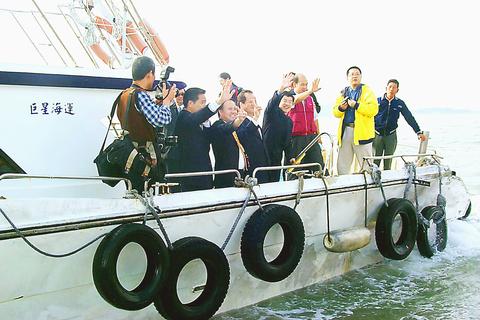A group of legislators who were on an inspection tour in Kinmen yesterday made a spur of the moment decision to try to sail directly to China. Only high waves and mechanical problems stopped them from heading to Xiamen in China's Fujian Province.
Legislators from the Transportation and Communications Committee

PHOTO: WU CHENG-TING, TAIPEI TIMES
The legislators were originally scheduled to sail to Tatan
According to the legislators, they were trying to sail for Xiamen directly from Kinmen in order to challenge the government's ban on direct transportation between Taiwan and China.
Although local officials tried to convince them not to sail to Xiamen because of the high waves yesterday, Chen and the other lawmakers insisted on making the trip. Local officials then asked them to take the coast guard boat, which is bigger and safer. Chen and his colleagues turned down the suggestion and chose to make the trip on the boat they had.
After 30 minutes, however, the group was forced to turn back to Kinmen because of the high swell and minor mechanical problems. According to local police, even though the lawmakers didn't want to turn back, police would have been forced to stop them once they passed the center line dividing Taiwan's and China's territorial waters.
According to Chen's assistant, the group wanted to prove that a "happy sailing" (
Meanwhile, Mainland Affairs Council (
According to Tsai, there are still many difficulties to be overcome before the "small three links" can be effectively implemented. The government, however, will try its best to solve all the problems before January, she said.
"Hopefully, the `small three links' will be opened on time," Tsai said.

A magnitude 7.0 earthquake struck off Yilan at 11:05pm yesterday, the Central Weather Administration (CWA) said. The epicenter was located at sea, about 32.3km east of Yilan County Hall, at a depth of 72.8km, CWA data showed There were no immediate reports of damage. The intensity of the quake, which gauges the actual effect of a seismic event, measured 4 in Yilan County area on Taiwan’s seven-tier intensity scale, the data showed. It measured 4 in other parts of eastern, northern and central Taiwan as well as Tainan, and 3 in Kaohsiung and Pingtung County, and 2 in Lienchiang and Penghu counties and 1

FOREIGN INTERFERENCE: Beijing would likely intensify public opinion warfare in next year’s local elections to prevent Lai from getting re-elected, the ‘Yomiuri Shimbun’ said Internal documents from a Chinese artificial intelligence (AI) company indicated that China has been using the technology to intervene in foreign elections, including propaganda targeting Taiwan’s local elections next year and presidential elections in 2028, a Japanese newspaper reported yesterday. The Institute of National Security of Vanderbilt University obtained nearly 400 pages of documents from GoLaxy, a company with ties to the Chinese government, and found evidence that it had apparently deployed sophisticated, AI-driven propaganda campaigns in Hong Kong and Taiwan to shape public opinion, the Yomiuri Shimbun reported. GoLaxy provides insights, situation analysis and public opinion-shaping technology by conducting network surveillance

Taiwan is gearing up to celebrate the New Year at events across the country, headlined by the annual countdown and Taipei 101 fireworks display at midnight. Many of the events are to be livesteamed online. See below for lineups and links: Taipei Taipei’s New Year’s Party 2026 is to begin at 7pm and run until 1am, with the theme “Sailing to the Future.” South Korean girl group KARA is headlining the concert at Taipei City Hall Plaza, with additional performances by Amber An (安心亞), Nick Chou (周湯豪), hip-hop trio Nine One One (玖壹壹), Bii (畢書盡), girl group Genblue (幻藍小熊) and more. The festivities are to

AFTERMATH: The Taipei City Government said it received 39 minor incident reports including gas leaks, water leaks and outages, and a damaged traffic signal A magnitude 7.0 earthquake struck off Taiwan’s northeastern coast late on Saturday, producing only two major aftershocks as of yesterday noon, the Central Weather Administration (CWA) said. The limited aftershocks contrast with last year’s major earthquake in Hualien County, as Saturday’s earthquake occurred at a greater depth in a subduction zone. Saturday’s earthquake struck at 11:05pm, with its hypocenter about 32.3km east of Yilan County Hall, at a depth of 72.8km. Shaking was felt in 17 administrative regions north of Tainan and in eastern Taiwan, reaching intensity level 4 on Taiwan’s seven-tier seismic scale, the CWA said. In Hualien, the